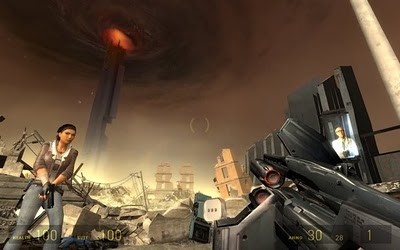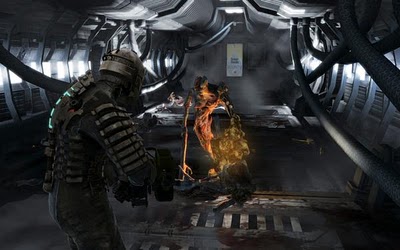This post has not been edited by the GamesBeat staff. Opinions by GamesBeat community writers do not necessarily reflect those of the staff.
When Sonic the Hedgehog taps his foot, folds his arms, and looks out from the TV at you sitting on the couch, does that lessen the feeling of "being" Sonic?
A narrative purist might insist that there should be no separation between protagonist and player. Every shot, every step, and every movement of the head should originate from the player alone. The protagonist acts as a vessel for the gamer; their experiences merge, and, if done well, the player becomes completely immersed in the game world.
Clichéd as it may be to mention Half-Life in an article like this, it's worth doing since the game is such an absolutest in this regard. Freeman is hardly a character at all — such is the level of control the player has over him.
At first glance this approach to storytelling seems ideal. After all, if we wanted to experience someone else's story would we not just watch a movie? It's jarring to have choices made outside of your control, and in effect we become what I can only think to describe as a fourth person to proceedings; too in control to be a third, and yet a little too impotent to truly be first.
The more you think about it, however, the more you realize how few games actually go down this route. Half-Life and Bioshock are literally the only two recent examples I can bring to mind (feel free to bring up more in the comments). Some might argue that their rarity is as a result of a deficiency in a developer's skill, but in my opinion the problem is actually far deeper.
Having a protagonist who can only act through the will of the player is constricting, because that doesn't allow for a very strong lead character. It would be impossible for a game to allow you to do absolutely anything you wanted, so you're always following someone else's orders; always a part of a group but never in control of its direction. It's a storytelling constraint in a medium that already struggles to weave unique tales of its own.
This style of narrative also heavily favors a first-person perspective. This might seem like an odd statement, so allow me to explain: Obviously, a third-person perspective implies a visible, on-screen protagonist, and this character needs to react to the world around it. It needs to shiver when it's cold, gasp when it's surprised, and get fidgety when you leave it stationary for too long.
If a game doesn't do these things it breaks the immersion, but if it does it removes some agency from the player. The first Dead Space struggled with this a great deal. Isaac Clarke was a completely human-controlled protagonist, which meant that when he started seeing apparitions of his girlfriend the on-screen character didn't react at all. The fact that it left me as a player confused was perhaps intentional, but Clarke's imperturbability was just plain weird.
Conversely, when a protagonist performs actions which did not originate from the player's control, that protagonist becomes a character in his own right, which fundamentally alters the structure of the narrative. That creates a 'dual protagonist,' if you'll excuse the attempt at phrase-coining.
Once a dual protagonist exists and a character is already acting outside of the player's agency, why not reap all the benefits and take control over the pacing and presentation of storytelling moments via cut-scenes?
Personally, I'd be very interested in a game that takes the dual protagonist idea to an extreme, by perhaps having a character who's aware of the fact that he has no control over his own actions. Such a game has a lot of comic potential; imagine a character who's taken places by the player while simultaneously, through dialogue, makies his opposition to this very clear.
So does it bother you when a character makes choices which are beyond your control, or are you prepared to live with it if it leads to a better story?
Comment like your lives depended on it, people!




